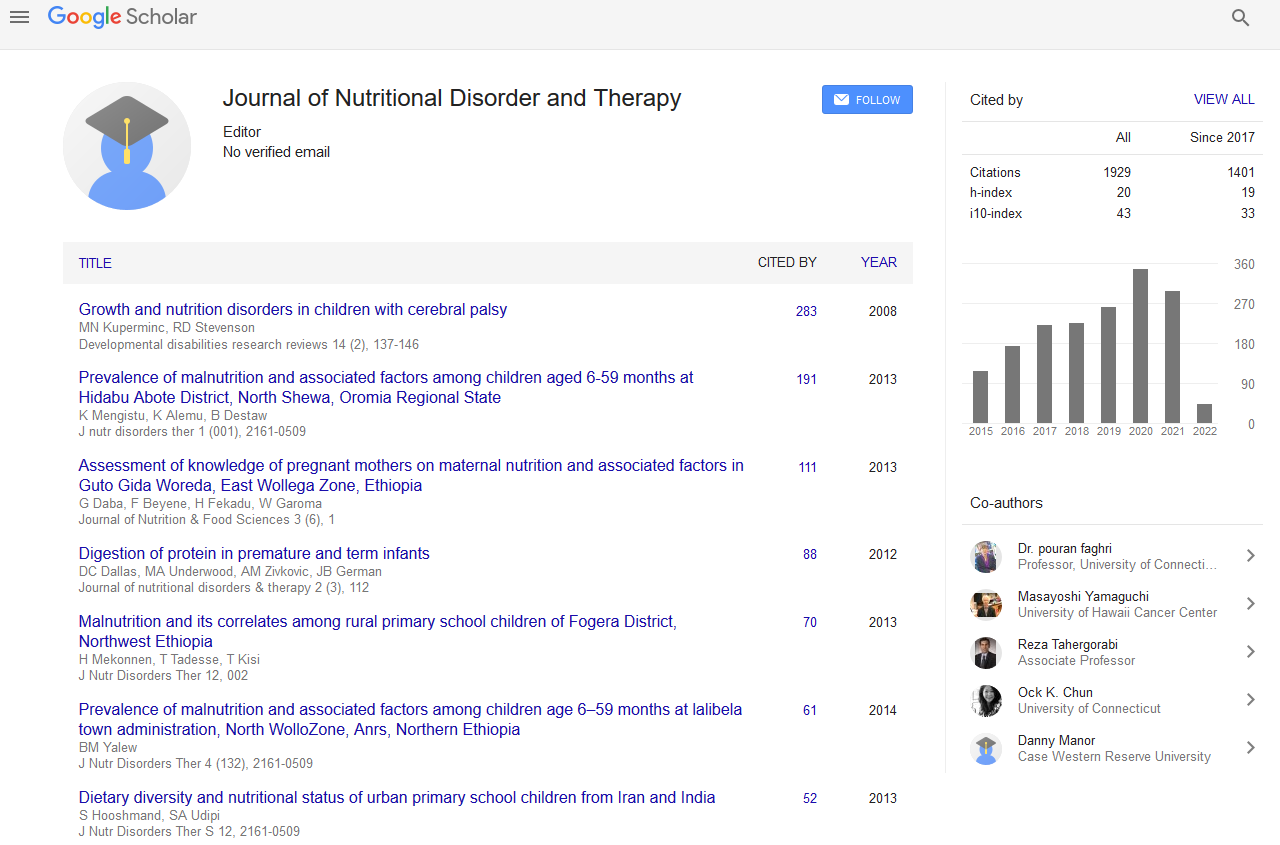Indexed In
- Open J Gate
- Genamics JournalSeek
- Academic Keys
- JournalTOCs
- Ulrich's Periodicals Directory
- RefSeek
- Hamdard University
- EBSCO A-Z
- OCLC- WorldCat
- Publons
- Geneva Foundation for Medical Education and Research
- Euro Pub
Useful Links
Share This Page
Journal Flyer

Open Access Journals
- Agri and Aquaculture
- Biochemistry
- Bioinformatics & Systems Biology
- Business & Management
- Chemistry
- Clinical Sciences
- Engineering
- Food & Nutrition
- General Science
- Genetics & Molecular Biology
- Immunology & Microbiology
- Medical Sciences
- Neuroscience & Psychology
- Nursing & Health Care
- Pharmaceutical Sciences
Abstract
Nutritional Assessment of Renal Transplant Recipients Using DEXA and Biochemical Parameters
Gokul Ramani, Georgi Abraham, Milly Mathew and Nancy Lesley
Introduction and Aims: Malnutrition is frequently encountered in patients with CKD. Despite successful renal transplantation, malnutrition ensues. We evaluated the relationship between serum albumin levels, and various indicators of nutritional status.
Methods: We did a retrospective study of 249 post-transplant patients who successfully underwent renal
transplantation (between1995-2012) at a tertiary care center. Serum parameters such as albumin (bromocresol green Method) hemoglobin, electrolytes, creatinine, prednisolone dose and presence of diabetes mellitus were analyzed. Lifestyle factors such as smoking, alcohol and diet, BMI were also looked at. We classified Serum Albumin as <3-3. 4 g/dL, 3. 5-3.9 g/dL, and more than 4 g/dL. We classified BMI as per WHO guidelines. Dual Energy X-Ray Absorptiometry was used to evaluate body composition, including lean body mass, fat body mass and fat percentage. Descriptive statistics, co-relational statistics and Pearson’s Chi-Square test was used.
Results: Among the 150 Males and 99 females, the mean age was 46 ± 13 years. The mean serum albumin value was 3. 6 ± 0.6 g/dL. 10% had a normal BMI, 62% Pre Obese, 21% Class 1 Obese, 5% Class 2 Obese, and 2% Class 3 Obese. A meat-based diet was ingested by 76% of our study group, and 24% were pure vegetarians. The mean dose of prednisolone taken was 20 ± 10 mg/day. 5% of the transplant patients were deceased and 1% had a failed graft. On follow up we found a significant positive correlation between serum albumin and hemoglobin (p=0. 002), LDL (p=0.046), Fat% (p=0.032) and a meat-based diet (p=0.032). A serum albumin value of>4g/dL was observed in 46% of those ingesting a meat-based diet, in contrast to 25% pure vegetarians. 66% of the vegetarians had a serum albumin value ranging from <3-3. 4 g/dL. There were negative correlations between prednisolone
dose and serum albumin (p=0.005), FM (p=0. 006), Fat% (p=0. 002) and serum Creatinine (p=0.013). A positive correlation between hemoglobin levels and LDL (p=0.005), FM (p= 0.004), HCO3- (p=0. 015) and Cl-(p=0.012), and hemoglobin levels and potassium levels (p=0.015) were observed. No significant co-relation was observed between serum albumin and patient survivals.
Conclusions: Serum albumin varies with diet, and is significantly higher among those eating a meat-based diet following transplant. Post-transplant mild obesity was prevalent in 62% of our study group. A higher fat content was associated with higher serum albumin levels, which may reflect a better nutritional status. Lower maintenance doses of prednisolone may improve the Albumin Levels. A further randomized controlled trial looking at the role of protein supplementation in vegetarians following renal transplantation as well as evaluating the effect of lowered prednisolone dose is warranted.


